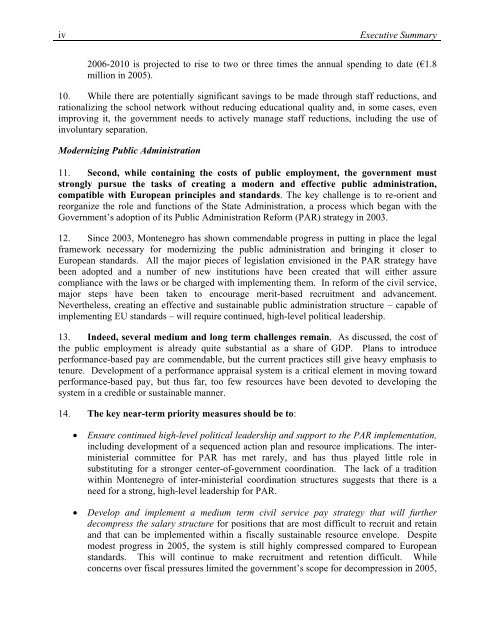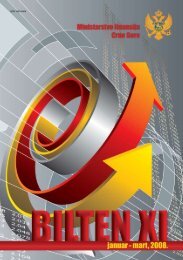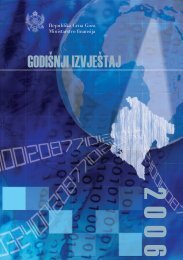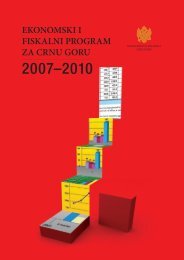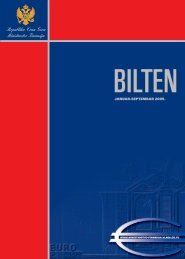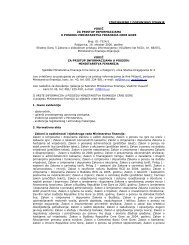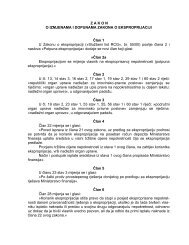Republic of Montenegro: Public Expenditure and ... - Vlada Crne Gore
Republic of Montenegro: Public Expenditure and ... - Vlada Crne Gore
Republic of Montenegro: Public Expenditure and ... - Vlada Crne Gore
You also want an ePaper? Increase the reach of your titles
YUMPU automatically turns print PDFs into web optimized ePapers that Google loves.
iv<br />
Executive Summary<br />
2006-2010 is projected to rise to two or three times the annual spending to date (€1.8<br />
million in 2005).<br />
10. While there are potentially significant savings to be made through staff reductions, <strong>and</strong><br />
rationalizing the school network without reducing educational quality <strong>and</strong>, in some cases, even<br />
improving it, the government needs to actively manage staff reductions, including the use <strong>of</strong><br />
involuntary separation.<br />
Modernizing <strong>Public</strong> Administration<br />
11. Second, while containing the costs <strong>of</strong> public employment, the government must<br />
strongly pursue the tasks <strong>of</strong> creating a modern <strong>and</strong> effective public administration,<br />
compatible with European principles <strong>and</strong> st<strong>and</strong>ards. The key challenge is to re-orient <strong>and</strong><br />
reorganize the role <strong>and</strong> functions <strong>of</strong> the State Administration, a process which began with the<br />
Government’s adoption <strong>of</strong> its <strong>Public</strong> Administration Reform (PAR) strategy in 2003.<br />
12. Since 2003, <strong>Montenegro</strong> has shown commendable progress in putting in place the legal<br />
framework necessary for modernizing the public administration <strong>and</strong> bringing it closer to<br />
European st<strong>and</strong>ards. All the major pieces <strong>of</strong> legislation envisioned in the PAR strategy have<br />
been adopted <strong>and</strong> a number <strong>of</strong> new institutions have been created that will either assure<br />
compliance with the laws or be charged with implementing them. In reform <strong>of</strong> the civil service,<br />
major steps have been taken to encourage merit-based recruitment <strong>and</strong> advancement.<br />
Nevertheless, creating an effective <strong>and</strong> sustainable public administration structure – capable <strong>of</strong><br />
implementing EU st<strong>and</strong>ards – will require continued, high-level political leadership.<br />
13. Indeed, several medium <strong>and</strong> long term challenges remain. As discussed, the cost <strong>of</strong><br />
the public employment is already quite substantial as a share <strong>of</strong> GDP. Plans to introduce<br />
performance-based pay are commendable, but the current practices still give heavy emphasis to<br />
tenure. Development <strong>of</strong> a performance appraisal system is a critical element in moving toward<br />
performance-based pay, but thus far, too few resources have been devoted to developing the<br />
system in a credible or sustainable manner.<br />
14. The key near-term priority measures should be to:<br />
• Ensure continued high-level political leadership <strong>and</strong> support to the PAR implementation,<br />
including development <strong>of</strong> a sequenced action plan <strong>and</strong> resource implications. The interministerial<br />
committee for PAR has met rarely, <strong>and</strong> has thus played little role in<br />
substituting for a stronger center-<strong>of</strong>-government coordination. The lack <strong>of</strong> a tradition<br />
within <strong>Montenegro</strong> <strong>of</strong> inter-ministerial coordination structures suggests that there is a<br />
need for a strong, high-level leadership for PAR.<br />
• Develop <strong>and</strong> implement a medium term civil service pay strategy that will further<br />
decompress the salary structure for positions that are most difficult to recruit <strong>and</strong> retain<br />
<strong>and</strong> that can be implemented within a fiscally sustainable resource envelope. Despite<br />
modest progress in 2005, the system is still highly compressed compared to European<br />
st<strong>and</strong>ards. This will continue to make recruitment <strong>and</strong> retention difficult. While<br />
concerns over fiscal pressures limited the government’s scope for decompression in 2005,


